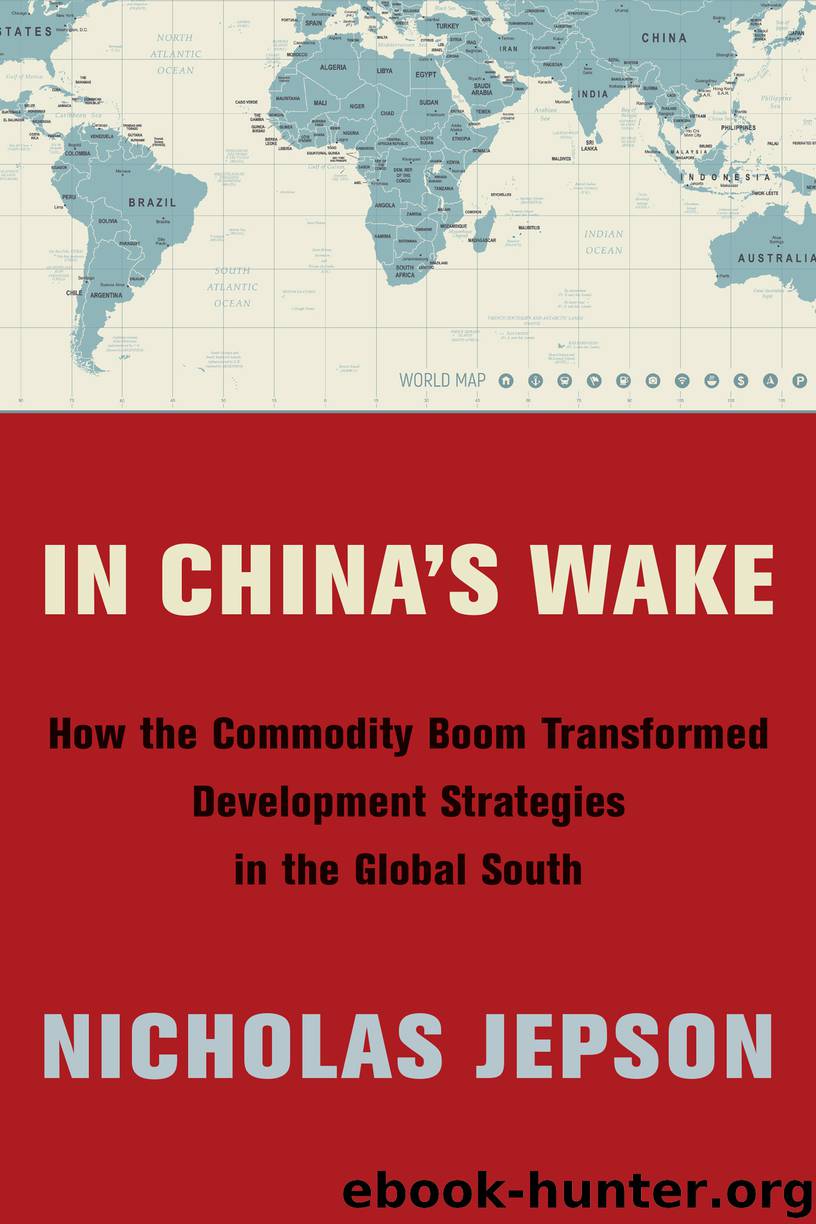In China's Wake by Nicholas Jepson

Author:Nicholas Jepson
Language: eng
Format: epub
Publisher: Columbia University Press
Conclusion
It is clear that, during the commodity boom, DDO states largely continued to follow the donor-driven agenda, which constitutes a particular form of neoliberalization that had been adopted as a means of addressing some of the more obvious contradictions of the early structural adjustment programs. This is perhaps surprising, given that the potential for domestically derived changes in political-economic direction did open up during the boom. Export prices rocketed, aid dependence declined, and DDO states’ natural resource endowments came to seem ever more attractive to transnational extractive firms. As with the other types, it is the nature of state–society relations in Zambia, Laos, and Mongolia that best explains this otherwise puzzling inertia on the part of their governments.
The typology of extractive regimes is premised on the overall argument that, with the path largely cleared of neoliberalizing pressures by China-driven changes in resource export markets, the approach taken by each state depended upon the nature of the particular social coalition that was able to gain control over the state and to set policy in a manner that favored its interests. In two senses, the DDO type may be said to stand as a variation upon this basic theme. First, as with the EO type discussed in chapter 7, in the absence of widespread class formation, it was the state managers themselves, along with allied elites, who constituted the dominant social sector. Although they were not, for the most part, engaged in large-scale accumulation, their position at the pinnacle of the state allowed them access to distributional resources that far outweighed any private sources of capital within the domestic sphere. In the (relative) absence of local capitalists or organized popular classes, political elites (though sometimes internally fractious) lacked serious challengers to their rule and were able to co-opt and absorb any nascent threats through control of patronage networks—as, for instance, in the regular defection of Zambian political figures to the current party of government.
Since rising extractive prices would seem to constitute an obvious source of increased resources for patronage, though, a turn to increase the state’s take in these sectors might be expected, even if this were unaccompanied by any coherent political-economic agenda, as is arguably the case in a state like Angola. In fact, to some extent, this did occur, with Zambia and Mongolia both experiencing wrangles over extractive ownership and taxation regimes. That these efforts tended to be rather ad hoc and unsystematic, though, points to a second key variation seen in the DDO type that sets it apart from its EO counterpart. This is the legacy of aid dependence, which, in addition to effects on independent state capacity and bureaucracy, meant that DDO states, unlike those of EO cases, entered the commodity boom with a significant preexisting source of allocative resources, in the form of official development assistance. As aid levels dropped, there was clearly has been more room to challenge donor priorities; this was most obviously seen in Zambia under the PF. With ODA totals still relatively substantial,
Download
This site does not store any files on its server. We only index and link to content provided by other sites. Please contact the content providers to delete copyright contents if any and email us, we'll remove relevant links or contents immediately.
| Arms Control | Diplomacy |
| Security | Trades & Tariffs |
| Treaties | African |
| Asian | Australian & Oceanian |
| Canadian | Caribbean & Latin American |
| European | Middle Eastern |
| Russian & Former Soviet Union |
The Secret History by Donna Tartt(19083)
The Social Justice Warrior Handbook by Lisa De Pasquale(12190)
Thirteen Reasons Why by Jay Asher(8907)
This Is How You Lose Her by Junot Diaz(6885)
Weapons of Math Destruction by Cathy O'Neil(6279)
Zero to One by Peter Thiel(5798)
Beartown by Fredrik Backman(5751)
The Myth of the Strong Leader by Archie Brown(5507)
The Fire Next Time by James Baldwin(5440)
How Democracies Die by Steven Levitsky & Daniel Ziblatt(5218)
Promise Me, Dad by Joe Biden(5153)
Stone's Rules by Roger Stone(5087)
A Higher Loyalty: Truth, Lies, and Leadership by James Comey(4959)
100 Deadly Skills by Clint Emerson(4924)
Rise and Kill First by Ronen Bergman(4787)
Secrecy World by Jake Bernstein(4751)
The David Icke Guide to the Global Conspiracy (and how to end it) by David Icke(4717)
The Farm by Tom Rob Smith(4506)
The Doomsday Machine by Daniel Ellsberg(4489)
